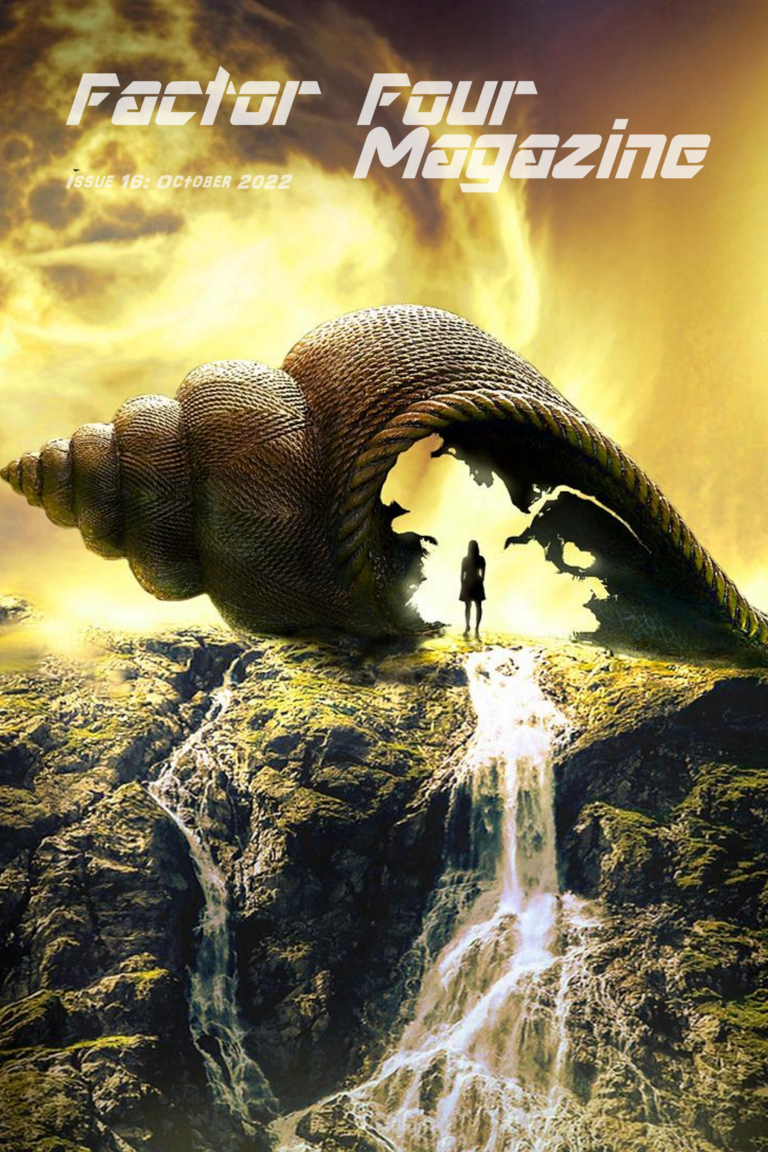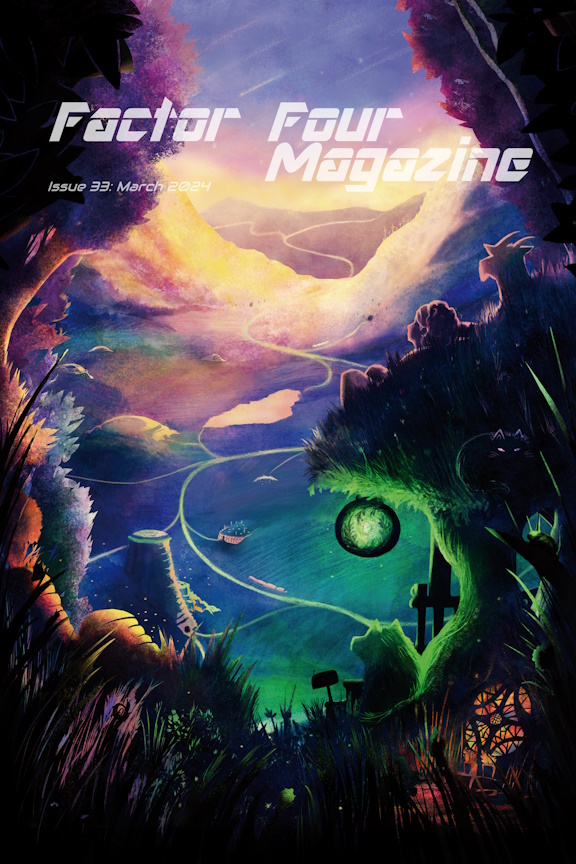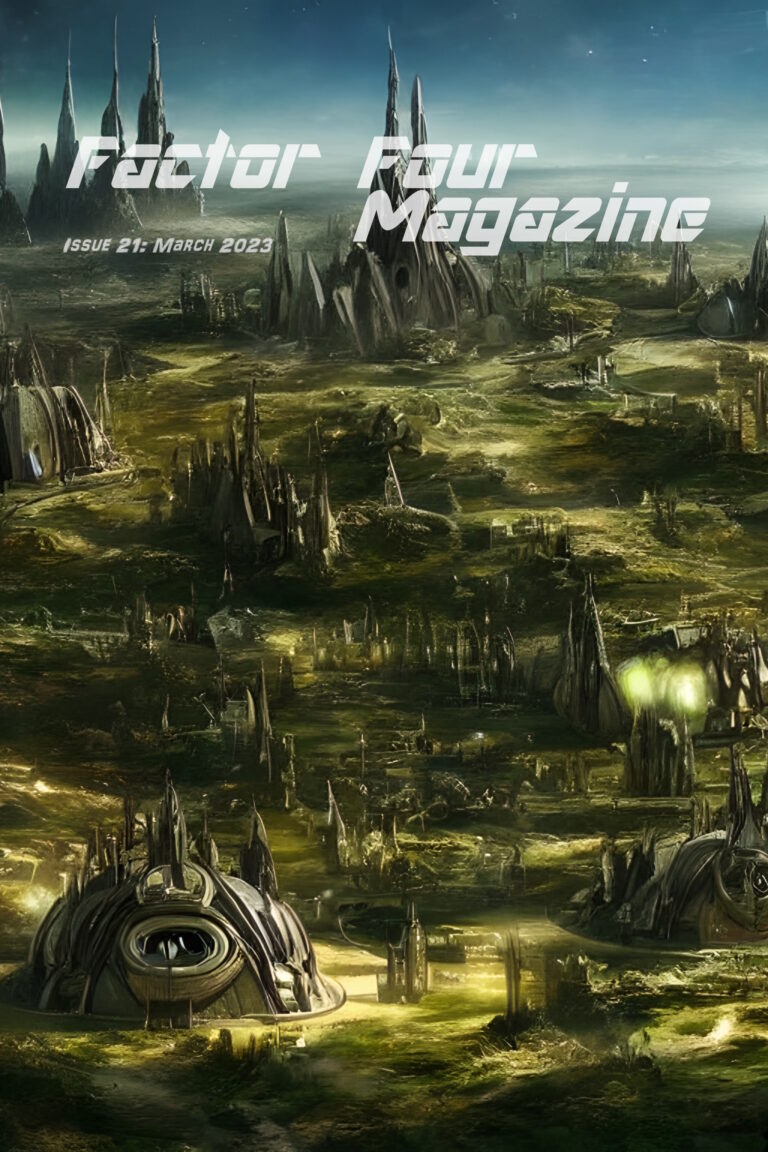The Cailleach by Nick Badot

Meagan always painted her the same way: nude and spread-eagled on a bed of buttery pink flowers, red feathers sprouting from bare shoulders, cheeks flushed by pollen. The spectre of a sneeze dances in the endless, liminal space between the bridge of her nose and the oval of her lips. She is stunning in her impermanence. A maze of lesions covers her parchment skin, glowing crimson as her body slowly disintegrates in the torrid sunset.
Her hand is outstretched on the canvas, palms open to catch the light. Meagan knows that if she could place her hand in hers once more, it would become light as air. A lightness that would spread to her arms, swell in her torso and reach her extremities, until she floated above the lush valley, above the tapestry of flowers, until she could see the harsh snow-capped mountains that encircled this island of summer.
“What’s your name?”
That was the first thing she had said when she stumbled upon the refuge of the meadow, frost flecking her hair, hands numb from the brutal cold. The figure in the flowers was like nothing she had ever seen. She dispelled the aches of Winter with her presence. Radiant but not blinding, innocent without being naive – confidence bereft of arrogance.
Meagan fell in love instantly.
“I have too many names to count.” The figure laughed, and the flowers laughed with her. “More recently, they call me the Hag of Beara.”
Everyone knew the Hag, of course. She shaped the landscape and brought the winters, donning the crown of seasons when Brighde laid down to rest at Samháin, and holding it until Bealtaine. Meagan’s mother once told her that if the first day of February was long, it would mean a cold winter, because the Hag needed the light to go and collect firewood.
Could this vision before her really be the Hag? The one whose cold breath froze babes in their cribs and suffocated crops under the ice? How could something so beautiful be so cruel?
“You don’t look like a hag to me.” Meagan whispered.
Another laugh, sonorous and rich, reverberating through the meadows.
“Call me Cailleach if you like, names have little importance to me. I care more about doings and beings.” Cailleach shrugged her shoulders, her dark eyes turned violet and then turquoise. “Who are you?”
“I– I’m a sheep farmer’s daughter, Lady Cailleach.”
A frown. Meagan hated the frown – in that moment, nothing was more important than the approval of this strange goddess, to be worthy of her regard. A frown meant failure.
“I didn’t ask whose daughter you were, I asked who you are. Why are you here?”
“Well, I was searching for a missing lamb, and I got lost–”
“No, no, no, lass. Why are you on this earth? What makes you smile? What makes you cry? Why are you here?”
“I– I like to paint, Lady Cailleach.”
“Why?”
Nobody had ever asked her, she had never thought about it herself. It had always been instinctual. But there was clarity in the meadow, in this little island of summer, and the answer crystallised in her mind, clearer than any lake.
“Because I can capture the beauty of the world.”
Cailleach nodded. The answer seemed to satisfy her. Heat rushed to Meagan’s cheeks.
She had so many questions, she wanted to know everything about her mysterious companion, the questions clamoured around her mouth, jostling to get through.
“Is it true you bring the winter?”
“Someone has to do it.”
“But why? Winter is misery for us, we barely scrape by and survive as it is.”
Meagan shuddered inwardly. She did not want to antagonise the goddess.
To her relief, the Cailleach did not frown again. “You already answered your own question.”
“How so?”
Cailleach smiled, it was a kind smile. “Do you see these cracks in my skin?”
Meagan nodded.
“Every morning, they appear and grow as the sun waxes and wanes, and when it sets I fall apart. I die. Only to be born anew at dawn. This is the burden of impermanence, but it is necessary. A cure from the cynicism of immortality. It allows me to appreciate every blossoming flower, every small creature that rustles the leaves. It allows me to live. Do you understand?”
“I’m not sure that I do.”
“You said you loved painting because it captures beauty. If all things beautiful were permanent and fixed, there would be no need to capture them. Without loss, no gain. Without winter, no summer. Without death… Every force exists in opposition, and beauty lies in the balance. Beauty is loving every small and impermanent thing, exulting in every fleeting joy.”
The sunlight caught Cailleach’s hair and her feathers, and the whole world turned gold..
Tears welled in both their eyes.
“I– think I understand now.”
“And what will you do about it?”
The sun was about to set.
“I want to enjoy this moment. I want to capture it.”
The Cailleach smiled, moved closer, arms outstretched. Meagan opened herself to the embrace, caught the buttery scent of the flowers, felt the petals gentle motions on her feet, the softness of the Cailleach’s lips.
Her kiss was the cold crucible of winter and the joyous rapture of a world brimming with light. There was no one without the other. Meagan truly understood then. She held the Cailleach in her arms as the sun vanished on the horizon.
The goddess turned to ash, slipped through her fingers into the roaring sea of stalks petals.
Then the meadow faded too, and when the snow-laden pines materialised around her, a lamb was bleating at her feet.
Meagan returned home, and spoke to nobody about what she had seen. She searched for the meadow and the Cailleach every winter since, but never found her.
Perhaps it was better that way.
Nevertheless, she would not stop searching.
Until then, she could paint.




